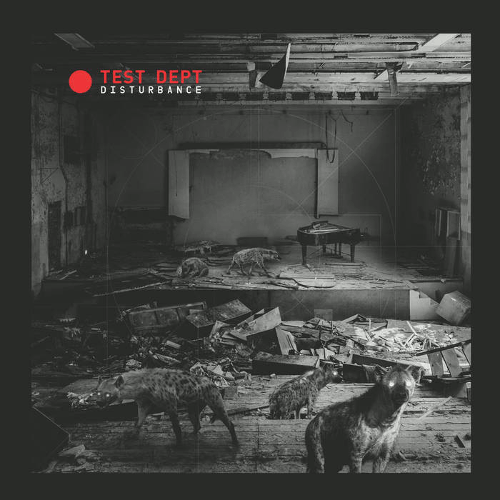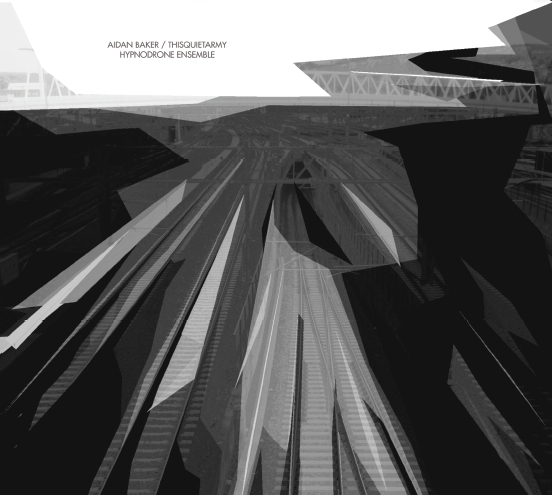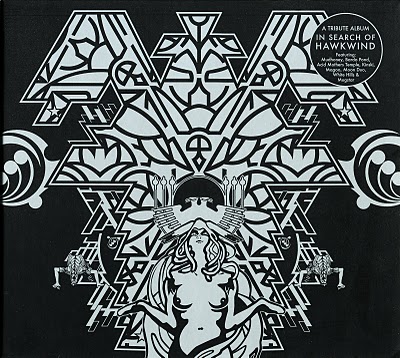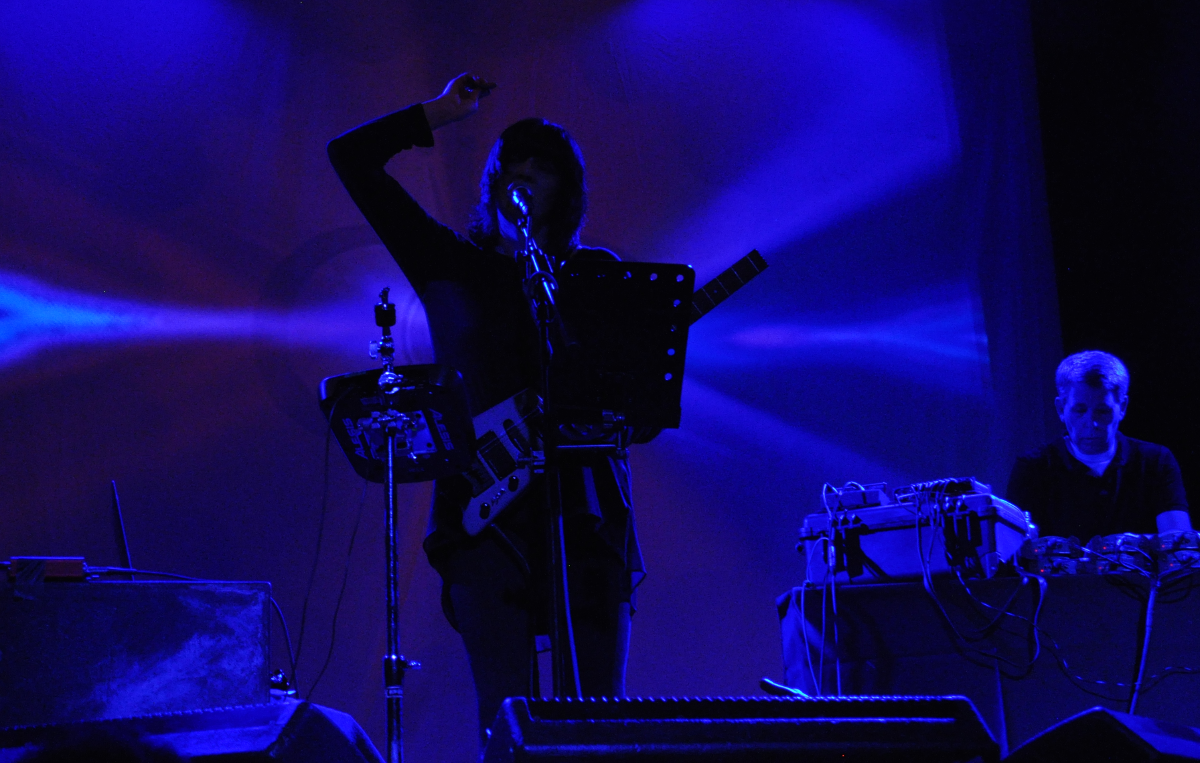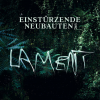 As a commemoration of the first world war, Einstürzende Neubauten could have so easily brewed up a mangled litany of compressed air screams, torn metal and had done with it. The opening track certainly has a good go. Aptly entitled “Kriegsmachinerie,” it’s a track that flash-floods the band’s pyroactive past in the screech of metal against metal. A twisted twilight caught in the whites of Luigi Russolo‘s eyes, burning in atonal drags and darts of violin as exhaust fumes pirouette across gigantic tensions, descending into a shimmering calm before re-birthing in screams of war. It’s an amazing start, but Lament doesn’t complacently follow it with more of the same (I for one wouldn’t have minded if they did); instead they delve deeper into the subject, finding new perspectives from the dusty archives, and as the green emptiness of the cover hints, nobody is left to testify, after all. A cheeky bilingual rework of the British national anthem (which was shared at the time with Germany, among others) follows in the form of “Hymnen,” which perfectly captures that patriotic paper bag which was soon to be split wide open and churned over as plumbs of soil mushroomed the sky.
As a commemoration of the first world war, Einstürzende Neubauten could have so easily brewed up a mangled litany of compressed air screams, torn metal and had done with it. The opening track certainly has a good go. Aptly entitled “Kriegsmachinerie,” it’s a track that flash-floods the band’s pyroactive past in the screech of metal against metal. A twisted twilight caught in the whites of Luigi Russolo‘s eyes, burning in atonal drags and darts of violin as exhaust fumes pirouette across gigantic tensions, descending into a shimmering calm before re-birthing in screams of war. It’s an amazing start, but Lament doesn’t complacently follow it with more of the same (I for one wouldn’t have minded if they did); instead they delve deeper into the subject, finding new perspectives from the dusty archives, and as the green emptiness of the cover hints, nobody is left to testify, after all. A cheeky bilingual rework of the British national anthem (which was shared at the time with Germany, among others) follows in the form of “Hymnen,” which perfectly captures that patriotic paper bag which was soon to be split wide open and churned over as plumbs of soil mushroomed the sky.
Neubauten have chosen their sources well, focusing on the humanity within the monstrous, plucking their sources from obscurity, the first being frontline poet Peter van den Broeck. His words are read by Blixa accompanied by the percussive dance of NU Unruh on barbed wire harp. It’s a soberingly simple text hinting at the claustrophobia of trench warfare to a soundtrack that sounds like a entangled body jiggling in a barbed embrace. More percussive flavours follow on “Der I. Weltrkrieg,” an inventive concept that reduces the whole war into beaten plastic pipes. Each pipe symbolising a country and its colonial grip; each day one beat in a bar, the action run through with international voices and Blixa inserting the odd historical underscore. It really captures the infection of the war beautifully, as country after country is slowly swallowed up in its 13 minutes, at full pelt the beats mirage-booming a distant bass-like rumble of heavy artillery fire; with the silence that finally symbolises armistice a deafening full stop.
Taking you in an altogether unexpected tangent is a chirpy music hall ditty about the perils of no man’s land, a reworked proto-jazz song by the Harlem Hell Fighters, who were a US Army division of African-American and Puerto Ricans who developed a fearsome reputation as trench marauders, its upbeat camaraderie, hijacked in part by Blixa nervously whispering “We can’t stop these men, they are devils, they smile while they kill and you can’t catch them alive.” The second van den Broeck poem “Achterland” is offset by the eerily apt amplified crutches, clanks of shell cases and reverbed oddness that brings forth shuddering images of shellshock victims. I swear you can hear the gaited swing of an amputee, as temple-like teeterings affix Blixa’s meticulously-nuanced sinistria: “One should delouse my thoughts,” goes the text, with the hiss of compressed gas backing making you feel like you’re being slowly cooked in some gigantic pressure cooker.This is a long album at 73 minutes, and as you almost reach the halfway mark, a triptych ensues that initially floats around in ghostlike homage. Cloistered moans tongue-tied to orchestrated slides suddenly stuttering as the unbalanced swell around it throws a haunted house down your spine. Each segment begetting the previous, here shaken into the hammered brackets of “Abwartsspirale.” A monstrously echoed plate steel (nobody does industrial like Neubauten and after more than 30 years they’re still as sharp as ever) focusing the tension into the fizzing point of a drill bit, until a whirring chasm opens, deftly spiralled into fisted percussion, its reverbed trenches a humming wasteland of betweens. A string octet from renaissance composer Clemens finishes the threesome, and it seems as if the broken earth was leaking a requiem choired by desolate winds, intersected by the wax recordings of prisoners of war, a litany of now-lost souls crackling from the edge of oblivion.
This is just superb, and it’s not finished yet. A baroque sung piece interrupts the instrumental vibe in the form of “How Did I Die?” It’s a style Blixa has been refining since End Neu‘s “The Garden,” here coupled with a pinch of Perpetuum Mobile‘s “Youme & Meyou,” but down tempo(ed) to a drip of piano pinched in classical yawns. A deathly parade pinned to a Paul Nash-like deformity of landscape, constantly questioning then resurrecting on a triumphant defibrillation of (heart) beats, streaming violins falling about the words “We didn’t die” like celebratory ticker-tape.Marlene Dietrich‘s “Sag Mir Die Blumen Sind?” (“Where have all the flowers gone?”) follows to bowed paragraphing and plate militaries, but it’s the next track, the German title a mouthful of “Der Beginn Des Weltkrieges 1914 (Dargestellt Unter Zuhilfenahme Eines Tierstimmenimitators),” that truly steals the album’s limelight. A Tourette pleasure from the early 1920s penned by German writer and performer Joseph Plaut, telling the history of World War One through the medium of poetry and, wait for it, yes, would you believe it? — animal mimicry (my brain’s applauding already). A jewel of spitting vowels and knotting consonants that is pure Dada, words gutturally ZschzschKKRIEGing into you and out the otherside, ending on stutterings of “Hiiittttlerrr” as if sending out a future warning, all gloriously basted in scratching percussion, cymbals and guitar stabs.
Now this would have been a perfect sign off for me, but they choose to end on another Harlem Hell Fighters ditty, an optimistic lullaby with a certain Fred Astaire slow sway about it. Without a doubt, one of the records of 2014.
-Michael Rodham-Heaps-
